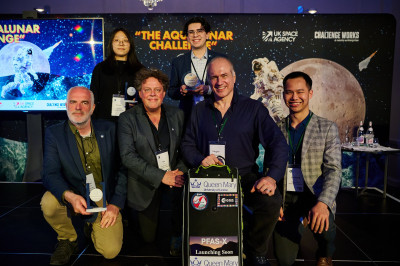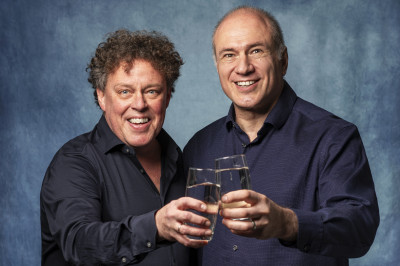News
Queen Mary-led team triumphs in Aqualunar Challenge with innovative water purification solution
28 March 2025


We are proud to announce that a Queen Mary-led team has secured the 2nd Runner-Up Prize in the AquaLunar Challenge - a £1.2 million international competition dedicated to advancing human habitation in space, by developing innovative methods to purify water buried beneath the Moon’s surface.
Queen Mary's AquaLunarPure Team, led by Dr Edo Boek and Prof Stoyan Smoukov with PhD students Dr Jincheng Wu, Dr Yuchen Si and Farid Bustos, collaborated with industrial researchers from Waternet (Netherlands) and academics from the University of Washington (USA). Their pioneering Super-Critical Water Oxidation (SCWO) technology is designed to convert heavily contaminated frozen lunar ice into clean drinking water - an essential breakthrough for sustainable human exploration of the Moon.
The competition’s grand prize winner and the two runners-up received a combined total of £300,000 to further develop their groundbreaking solutions.
These three winning teams were selected from 10 finalists, each of whom had previously received £30,000 in seed funding and extensive non-financial support, to refine their innovations ahead of the final submission.
Why is this exciting?
Water is essential for life on Earth and beyond. Future astronauts will need a reliable, energy-efficient, and autonomous ways to purify water on the Moon, both for human consumption and as an energy resource.
What makes AquaLunarPure's solution stand out?
- AquaLunarPure's Super-Critical Water Oxidation solution achieves 99.9998% purity, breaking down contaminants to less than 2 ppm.
- They maximise water recovery (over 99%), ensuring maximum In-Situ Resource Recovery (ISRU) and minimal waste.
- Their solution is energy efficient, as it uses direct heat from modular RTGs, avoiding unnecessary complexity. It is compact, light and cost effective, able to operate self-contained without dependence on kilometres of infrastructure.
- Autonomous operation: Built to function with minimal maintenance, even under extreme lunar conditions.
- Real-world impact: Innovations designed for space return to Earth for advanced destruction of emerging drinking water contaminants, such as PFAS.
An AquaLunarPure spokesperson said:
"This achievement is the result of hard work and collaboration. A huge thank you to our teams at Queen Mary, Waternet, University of Washington and all of our partners. This is just the beginning. We look forward to further developing our technology for both space and Earth."
Press and media including The Engineer and The Guardian covered the news.
| Contact: | Edo Boek |
| Email: | e.boek@qmul.ac.uk |
| People: | Edo BOEK Stoyan SMOUKOV |
| Research Centre: | Sustainable Engineering |




